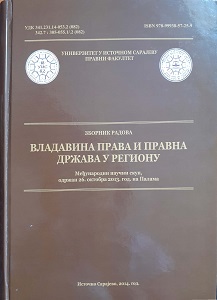Принцип екстрадибилности у екстрадиционом поступку
The Principle of Extradibility in Extradition Proceedings
Author(s): Milijana Lepir
Subject(s): Law, Constitution, Jurisprudence, Criminal Law
Published by: Правни факултет Универзитета у Источном Сарајеву
Keywords: Principle of extradibility;Politics;Military and religious offenses;
Summary/Abstract: One of the basic principles in extradition proceedings is the principle of extradibility. In extradition proceedings, this principle could be seen as an element of the general principle of legal certainty. By applying the principle of extradibility in extradition proceedings, a sense of security of residents of a state is created. In other words, they will not easily be transferred if the subject has not committed an extraditable offence.Legal formulation of the concept of extradibility has been greatly affected by historical circumstances that have influenced the understanding of rights and values, the necessity to protect the criminal law and to ensure the protection of state sovereignty. To better understand this principle, it is essential to make an overview of historical comprehension of the institute of extradition. The paper represents a prism of the oldest documents on extradition, a “journey” through periods of human civilization illustrated by explanation why certain acts were considered extraditable crimes. The concept of extraditable crimes inevitably raises the question of the legal nature of the institute of extradition. Thus, it is necessary to determine the true nature of the institute of extradition, including extraditable offenses in order to successfully implement extradition proceedings. What strikes us as particularly interesting in terms of the legal nature of extradition is the question whether extradition is an act of good will of the requested state, or it represents the fulfillment of its international obligations. In seeking answers to this question, the paper starts from the premise that extradition appears more as an act of international courtesy and satisfying mutual interests of two states, rather than the state's intentional imposition of an obligation or duty.In the spirit of the maxims that “history repeats itself” and “might makes right” this paper confirms the variability of legal determination of the principle of extradibility, considering the role of the politics as an active witness of the history.
- Page Range: 750-768
- Page Count: 19
- Publication Year: 2013
- Language: Serbian
- Content File-PDF

